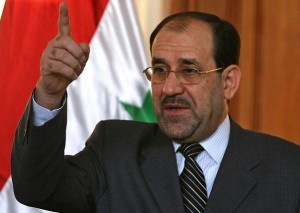 Iraq is ready to mediate between the Syrian government and opponents of President Bashar al-Assad to help end months of violence in the neighbouring country, an adviser to Iraqi Prime Minister Nuri al-Maliki said on Saturday.
Iraq is ready to mediate between the Syrian government and opponents of President Bashar al-Assad to help end months of violence in the neighbouring country, an adviser to Iraqi Prime Minister Nuri al-Maliki said on Saturday.
Iraq’s Shi’ite leaders are concerned that turmoil in Syria could bring a hardline Sunni leader to power should protests lead to the downfall of Assad, who is facing increasing international condemnation over a crackdown on protesters.
Ali al-Moussawi, Maliki’s media adviser, said Iraq was ready to receive the Syrian opposition to try to reach a solution to achieve the demands of the Syrian people and avoid bloodshed.
“We as a government … seek a solution. If this clash continues forever it will be harmful for all, particularly to the Syrian people and the Syrian state,” he said.
“He (Maliki) is clear he is ready for a dialogue with all the parties.”
Asked if the Iraqi government was already in talks with the Syrian opposition, Moussawi said: “I think it is early to say talks, but there is some kind of communication.”
In October, Maliki, a Shi’ite, urged Syria to open up its political system to end one-party Baath rule.
ISOLATION
Syria faces deepening international and regional isolation, with the Arab League, the European Union and the United States piling on increasingly tough sanctions to pressure Damascus to stop the crackdown on protesters and talk to its opponents.
Since the 2003 invasion which toppled Sunni dictator Saddam Hussein, Iraq’s Shi’ites have risen to power, drawing its leadership closer to Shi’ite Iran as well as to Syria, Tehran’s main Arab ally in a regional power struggle with Sunni-ruled states who have criticised the Syrian president.
Iraqi officials, trying to balance their interests in the region, say they are worried unrest in Syria could spill over their border and upset Iraq’s own delicate sectarian balance. They have resisted sanctions against Damascus.
Arab states have landed a hefty blow on Syria’s crisis-hit economy by stopping deals with its central bank and halting investment last month. Iraq voted against them.
Damascus, where the Assad family has ruled for 41 years, says regional powers helped incite the violence, which it blames on armed groups targeting civilians and its security forces.
The United Nations says more than 3,500 people have been killed since the unrest broke out in March inspired by uprisings which overthrew leaders in Tunisia, Egypt and Libya.

Leave a Reply
You must be logged in to post a comment.